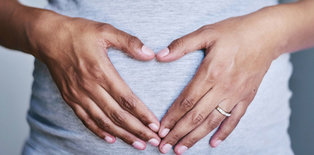Vaccines and Pregnancy: Protecting Mother and Baby

Pregnancy is a unique time, a mixture of excitement for the future of your family and a little trepidation. Every parent-to-be wants to protect their baby as best they can. One universal concern is the safety of vaccines during pregnancy.
Following are the facts about vaccines and pregnancy and the information you need to keep you and your baby safe and healthy.
What are vaccines?
Vaccines are products that produce immunity to a specific disease. They teach your body how to fight the virus or bacteria that cause the disease. Getting vaccinated can protect you from getting certain infections, which means that you can be exposed to the illness, but you won’t get sick. Sometimes, even if you do catch the illness, being vaccinated can keep you from getting severely ill.
A pregnant mother can share this immunity with her baby. Antibodies that are passed from mother to baby during pregnancy can help protect the baby in the initial few months of its life. That’s why the Centers for Disease Control and Prevention (CDC) has recommendations for the vaccines needed before, during, and after pregnancy.
What vaccines are recommended before pregnancy?
Prior to pregnancy, it is important to keep your vaccination status up to date. Certain infections, such as Rubella (also known as German Measles), if acquired during pregnancy, can cause harm, resulting in miscarriages or birth defects.
The vaccine available for protection against Rubella is the MMR (measles-mumps-rubella) vaccine, which contains live, attenuated (weakened) measles, mumps, and rubella virus. A second vaccine called MMRV is a similar vaccine that also protects against chicken pox (also known as Varicella), which contains live attenuated chickenpox virus, in addition to the others.
Vaccines made of live viruses are avoided in pregnancy, due to the theoretical risk of the virus crossing the placenta and infecting the fetus. However, protection against these infections is important when considering pregnancy.
Therefore, the CDC recommends that persons of childbearing age who are not pregnant and do not have evidence of immunity should get at least one dose of MMR vaccine. Out of an abundance of caution, it is recommended to avoid pregnancy for at least a month after vaccination with either of these immunizations.
It is important to note that it is safe for breastfeeding mothers to receive MMR vaccination. Breastfeeding does not interfere with the response to MMR vaccine, and the baby will not be affected by the vaccine through breast milk.
What vaccines are recommended during pregnancy?
During pregnancy, the goal of vaccination is two-fold: protecting the mother against serious illness and protecting the baby via the transfer of antibodies from mother to baby.
Pregnant individuals are more likely to get seriously ill from flu and COVID when compared to the non-pregnant population. Getting vaccinated against these viruses can help protect the mom from getting seriously ill, which in turn, keeps the baby safe. However, some recommended vaccines during pregnancy, such as Tdap, are given to the mother mainly for the baby’s protection.
Flu vaccine during pregnancy
Dangers of flu while pregnant
Getting flu during pregnancy is not only associated with a higher risk of hospitalization for the mother, but it can also lead to pregnancy complications, such as preterm labor and preterm birth. Maternal flu infection in the first trimester has been associated with an increased risk of birth defects.
Benefits of a flu shot during pregnancy
Getting a flu shot reduces a pregnant woman's risk of being hospitalized with flu by an average of 40 percent. Flu shots have been given to millions of people over many years and have an excellent safety record. Multiple studies have found no increased risk for miscarriage after flu vaccination during pregnancy.
Getting vaccinated for flu while pregnant also can help protect a baby from influenza for several months after birth. People who get the influenza vaccine while breastfeeding also develop antibodies against influenza that they can share with their infants through their breast milk. It is important to note that if you are pregnant, you should not get the nasal spray flu vaccine, which contains live attenuated flu virus.
Tdap vaccine during pregnancy
Dangers of whooping cough for babies
Whooping cough, also known as pertussis, is a very serious infection in babies. More than half the babies who get this infection before the age of one year require hospitalization. The infection can even be fatal and over two-thirds of deaths from whooping cough are among babies younger than two months. These babies are too young to receive a Tdap vaccine.
Benefits of Tdap vaccine during pregnancy
When a pregnant person gets the whooping cough vaccine during pregnancy, the protective antibodies are passed on to the baby before birth. These antibodies can protect the baby against whooping cough in the first few weeks of its life. The CDC recommends a whooping cough vaccine during the 27th through 36th week of each pregnancy, preferably during the earlier part of this period.
COVID-19 Vaccine during pregnancy
Dangers of COVID-19 in pregnancy
COVID infection during pregnancy or in someone who was recently pregnant is more likely to be severe, require hospitalization or an intensive care unit stay, or be fatal. In addition, it can result in pregnancy complications such as preterm delivery or stillbirth.
Benefits of COVID-19 vaccine during pregnancy
COVID-19 vaccination can protect against severe infection. It is important to note that none of the COVID vaccines contain live virus. They cannot make anyone sick with COVID, including people who are pregnant or their babies.
Like other vaccines given during pregnancy, COVID vaccination also helps protect the baby by transferring antibodies from mother to baby. Antibodies have been detected in the umbilical cord blood of babies whose mothers received COVID vaccination in pregnancy. Levels of these cord blood antibodies were even higher when the mother had received a booster dose with an mRNA COVID-19 vaccine during pregnancy. The antibody response in the cord blood has been noted to be more robust after maternal vaccination, compared to those who had COVID-19 illness during pregnancy.
Safety of COVID vaccines during pregnancy
There is growing evidence of the safety of these vaccines in pregnancy. Data from multiple studies across the world provide support that COVID vaccination in pregnancy is not associated with any birth defects, miscarriages, or pregnancy complications such as preterm birth, stillbirth, and excessive blood loss after delivery.
Recent data show that completing a two-dose primary mRNA COVID-19 vaccine series during pregnancy can help protect babies younger than age six months from hospitalization due to COVID-19. In these reports, most babies hospitalized with COVID-19 were born to individuals who were not vaccinated during pregnancy.
Talk to your doctor about staying up to date with your vaccines. Our doctors are available to help you through this wonderful time of your life. Learn more about our practice here.

About the Author:
Niharika Mehta, MD
Dr. Niharika Mehta is an attending physician in obstetric medicine at the Women’s Medicine Collaborative. Her clinical and research areas of interest include cardiovascular disease in pregnancy, severe maternal morbidity, thyroid disease in pregnancy and hematologic disorders in pregnancy.
Lifespan Living Newsletter
Find a Doctor

The right provider is in our network
Search more than 1,200 providers in our network.



